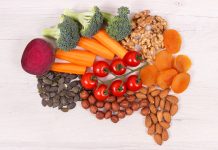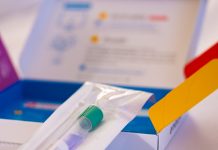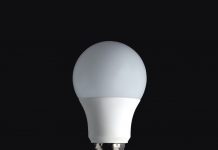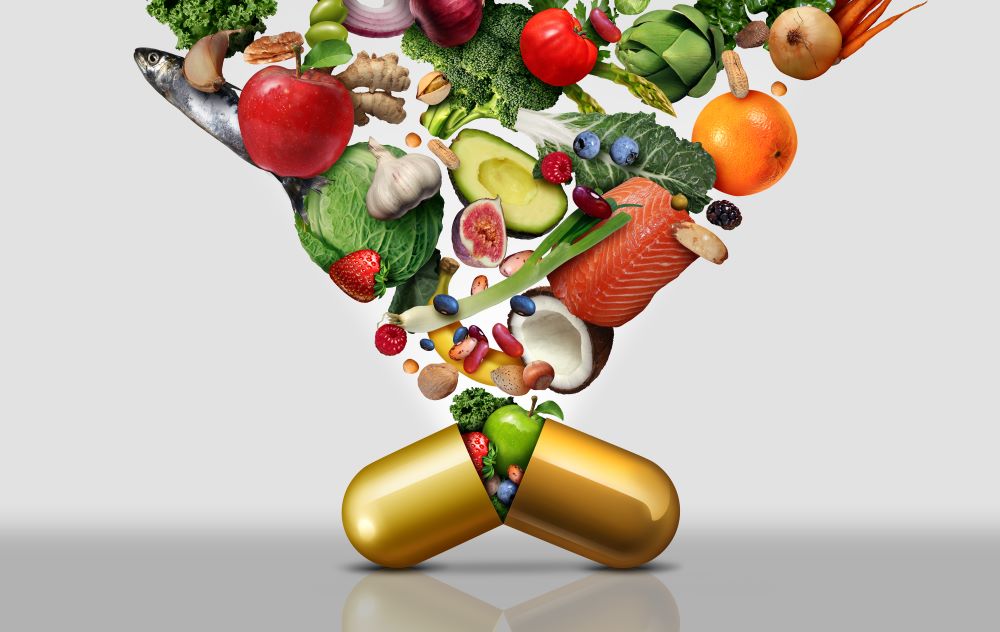Plant based diets are considered to be some of the healthiest nutrition lifestyles you can adopt! It’s completely possible to get all your vitamins and nutrients from plants—with just one exception. That’s Vitamin B12; and if you’ve stopped eating meat, you need to be extra thoughtful about incorporating it into your daily routine.
Vitamin B12 (also known as Cobalamin) is a water-soluble vitamin found in abundance in animal-based products (meat, fish, dairy products, eggs) so it is usually the first nutrient that vegetarians and vegans lack. Meat-eaters can also become deficient in B12 due to medications, surgery, or pregnancy.
Deficiencies in Vitamin B12 in those who eat animal-based products is rare (about 3-6% are affected between ages 20-60+ years old). Mild, or marginal, Vitamin B12 deficiencies are much more common, ranging from 15-20% of people aged 20-59 years old. (1)
Most of the causes of deficiency in Vitamin B12 are because of food ingested along with the B12 that binds to it and prevents the body from absorbing it or from underlying malabsorption of vitamins and minerals. Even if you do eat plenty of foods rich in B12, only 50-60% of the ingested amount will be absorbed. (1)
Fortified grains, fortified nondairy milk, and fortified nutritional yeast are non-meat-based sources for B12. It is still recommended to supplement with B12 if you don’t consume animal products, no matter how complete your plant-based diet may be.
Are you still at risk if you eat meat?
Low vitamin B12 levels can be caused by poor intake of foods high in B12, autoimmune disorders, and certain medications. Medications which can cause low vitamin B12 include common antacids (such as proton pump inhibitors PPIs, H2 antagonists), oral contraceptives, hormones taken for hormone replacement therapy, and in pregnancy or breast-feeding. Excessive consumption of alcohol is another leading factor in B12 deficiencies. B12 deficiencies can also be found in the elderly or in people who have gastrointestinal surgeries or malabsorptions caused by Crohn’s disease, Celiac disease, SIBO (small intestine bacterial overgrowth), pancreatic insufficiencies, and those who have undergone intestinal surgeries. (1) Speak with your doctor about testing your B12 level to determine if you need a supplement.
What happens if you don’t get enough B12?
If left untreated, Vitamin B12 deficiencies can result in pernicious anemia, a condition which causes a lack of red blood cells and can lead to neurological symptoms and damage. For others, vague sensations are their first clue that something is wrong. Tingling (a “pins and needles” feeling) can occur in hands and feet, fatigue, weakness, trouble concentrating, the loss of memory, and balance problems can occur. (2)
These are symptoms which are attributed to many other conditions which it makes it difficult to recognize based on symptoms alone. The best way to determine if there is a deficiency in Vitamin B12 is to check the levels through a blood test—but it you’re a vegetarian or vegan, or have drastically reduced your intake of animal-based products, it is important to supplement your diet with B12
What’s the difference between Cyanocobalamin and Methylcobalamin?
Vitamin B12 is called Cobalamin, but you’ll find B12 listed most commonly on vitamin and supplement labels as either Cyanocobalamin or Methylcobalamin.
Methylcobalamin is the natural form of B12 that you would find in food sources, while cyanocobalamin is a synthetic version of B12. Many supplements are made with methylcobalamin. Methylcobalamin is the form of the vitamin that the body converts to when it takes in cyanocobalamin.
The data isn’t extremely conclusive about which may be better for you; cyanocobalamin may be absorbed more efficiently by the body, but methylcobalamin may stay in your body longer. Due to its water-solubility, it is rapidly processed and excreted. (4)
Best B12 Supplements for Vegans
There are so many forms of B12 vitamins from capsules to gummies, melts, sprays, and sublingual drops, that if you’re tired of swallowing vitamins, you can be sure to find a form that works for you.
Gummies:
MaryRuth’s Vegan Vitamin D3+B12 Gummies combines Vegan B12 with necessary Vitamin D3 in one easy, delicious gummy vitamin!
Sprays:
Garden of Life Vegan Certified B12 Organic Spray
MaryRuth’s Organics Vegan Sublingual Spray
Melts:
EZ Melts Vegan B12 as Methylcobalamin Natural Cherry Flavor
Drops:
LiveWell Labs Vegan Vitamin B12 Drops
Capsules:
Doctor’s Best Vegan Fully Active B12 Vegetarian Capsules
Garden of Life Code Raw Vegan B12 Capsules
References
1. Shipton, Michael J, and Jecko Thachil. “Vitamin B12 deficiency – A 21st century perspective .” Clinical medicine (London, England) vol. 15,2 (2015): 145-50. doi:10.7861/clinmedicine.15-2-145
2. Skerrett, Patrick J. “Vitamin B12 Deficiency Can Be Sneaky, Harmful.” Harvard Health Blog, 2013, www.health.harvard.edu/blog/vitamin-b12-deficiency-can-be-sneaky-harmful-201301105780.
3. “Office of Dietary Supplements – Vitamin B12.” NIH Office of Dietary Supplements, U.S. Department of Health and Human Services, ods.od.nih.gov/factsheets/VitaminB12-HealthProfessional/.
4. Link, Rachael. “Methylcobalamin vs. Cyanocobalamin.” Healthline, Healthline Media, 12 May 2020, www.healthline.com/nutrition/methylcobalamin-vs-cyanocobalamin.































